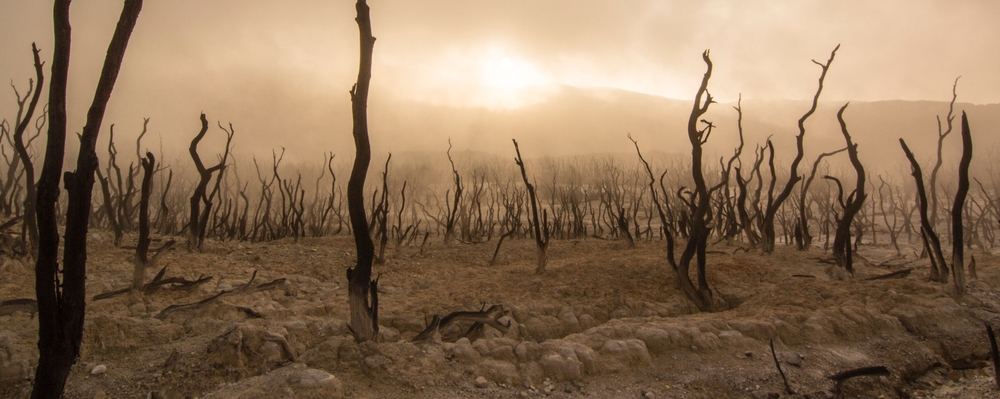Ecological Grief: a mental health response to climate change

Have you heard of the term ecological grief? This is a newly dubbed term that describes grief that is felt in response to anticipated ecological loss. These include feelings of depression, anxiety, suicidal ideation, post traumatic stress, and feelings of despair and hopelessness.
For e.g. Suicide rates in India have increased due to crop-damaging heat waves.
There is also a sense of cultural identity crisis as a result of ecological grief. In a documentary on the Labrador Inuit, filmmakers narrate a moving story on the effects of rapid climate change. "When we grieve the loss of a person, we come together with other people and perform rituals to work through these elements of grief. But when it’s the loss of place, or the degradation of a body of water, or when a species collapses, there are simply no rituals in place for processing the loss." Read more...
When we think about our generation and the generation that follows us, there is more that can be done to address climate change.
How you can help in small ways:
- Walk, cycle, or take transit
- Limit your consumption - reduce, reuse, recycle
- Limit your consumption
- Use less energy at home
- Eat less meat and more plant based foods
- Read more...
Thanks for sharing, Michelle! I have some additional resources to share on the topic...
****
Those who know me know that I talk a lot about climate change and its impact on mental health (my own included). Sometimes I joke about the Weather Network’s unnerving resemblance to a post-apocalyptic memoir, but on most days, I wonder how not to dwell in complete hopelessness at the thought that some of the world’s most powerful decision-makers are not making the right decisions.
Ecological grief is very real.
Climate-change scientists who are burdened by the weight of this reality have started to speak out about the overwhelming emotions that they face every day. They have shared their lived experience of ecological grief through hand-written testimonies on the blog: Is This How You Feel?
Their reflections are inspiring, moving and ultimately hopeful. A sense of collective resilience and power resound in these posts, and I was pleased to see the human-side of this work.
While I am glad terms like “ecological grief” are gaining traction within public discourse, I worry newfound psychiatric language like “solastalgia” could lead to undue pathologization and focus on biomedical mental health interventions instead of creating more spaces for peer-based support, education and advocacy on climate change.
Our psychological attachment to place runs deep: it is necessary for our wellbeing. For example, Root shock developed by Brooklyn public health psychiatrist, Dr. Mindy Thompson Fullilove, illustrates how the loss of urban spaces to gentrification caused trauma in individuals (mainly racialized residents) who were being systematically displaced and/or made homeless by the housing market. She describes it as a transgenerational collective loss: "It’s the loss of a massive web of connections, a way of being destroyed by urban renewal it was as if thousands of people who seemed to be with me in sunlight, we at some deeper level of their being, wandering lost in a dense fog, unable to find one another for the rest of their lives."
It is no coincidence that she uses atmospheric climate metaphors to describe the impact of root shock on one’s emotional ecosystem. She further elaborates “it is not a pain that should be pigeonholed in a diagnostic category but rather understood as a communication about human endurance in the face of bitter defeat.”
So I wonder, how can grief be a catalyst for change? From ecological grief to root shock, if we expose the human and emotional cost of climate change, is it more likely become a collective responsibility to heal?
Great stuff Christina! Thanks for sharing...
To your last comment here, I'm not sure if this is a workable solution. Seems like even catastrophe after catastrophe, world leaders are still not on the same page when it comes to forming a collaborative effort in tackling climate change. E.g. Almost 20 countries still haven't ratified the Paris Agreement.
It’s all very well to do what we can as individuals to reduce our carbon footprints. But just 100 companies are responsible for 71% of emissions. The reality is that a small number of very wealthy people are responsible for this catastrophe. And they’re choosing to continue to destroy the planet for the sake of short-term profit. This is the system we need to address if we’re to have the slightest hope of a livable world in the decades to come.
this is great, such a wonderful way to help shape the conversation . and great to see so many interesting new ideas in responding from a mental health lens/angle to the need for climate justice (and wondering how the particular gifts & knowledges that people who experience mental health issues/ self-identify as mad bring to these conversations)
we've also just started some conversations in our work team how we can contribute to positive action (since we spend so much of our lives at work, and the health sector has important role) - which these articles and responses show the challenge/tension in moving beyond individual acts (important but insufficient) to collective organizing for structural change.